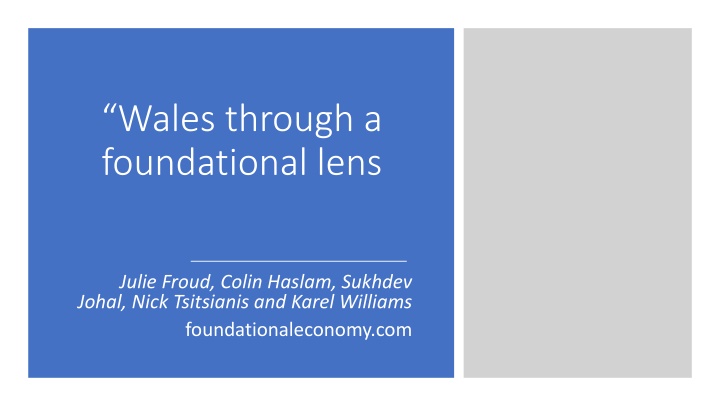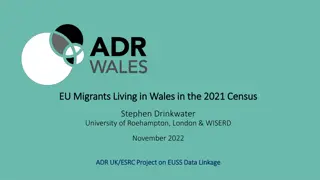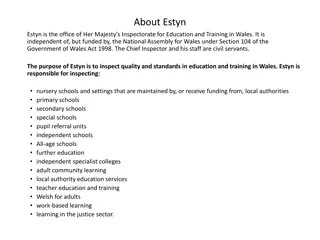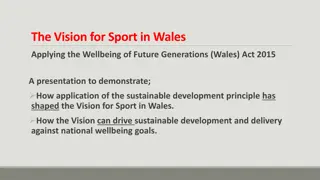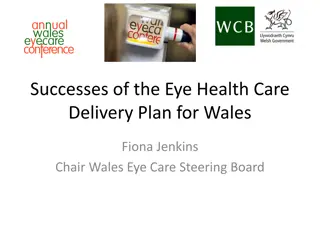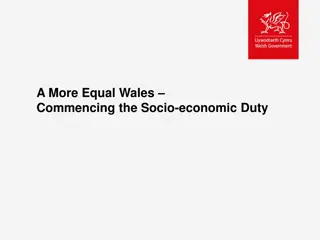Rethinking the Economy: The Foundational Lens on Wales
Foundational Economy redefines economic activity in Wales beyond GDP, focusing on essential sectors like utilities, transportation, healthcare, and education. It emphasizes the significance of foundational activities in driving sustainable growth and social welfare, challenging traditional economic metrics to reflect a more inclusive and holistic perspective.
Download Presentation

Please find below an Image/Link to download the presentation.
The content on the website is provided AS IS for your information and personal use only. It may not be sold, licensed, or shared on other websites without obtaining consent from the author.If you encounter any issues during the download, it is possible that the publisher has removed the file from their server.
You are allowed to download the files provided on this website for personal or commercial use, subject to the condition that they are used lawfully. All files are the property of their respective owners.
The content on the website is provided AS IS for your information and personal use only. It may not be sold, licensed, or shared on other websites without obtaining consent from the author.
E N D
Presentation Transcript
Wales through a foundational lens Julie Froud, Colin Haslam, Sukhdev Johal, Nick Tsitsianis and Karel Williams foundationaleconomy.com
GDP as the representation of economic activity Gross Domestic Product (GDP) has, for over fifty years, provided a singular representation of the economy. Growth in GDP is necessary to generate jobs and productivity so we can pay ourselves more.
The challenge is to deconstruct this undiscriminating aggregation which takes for granted the composition and causes of growth. To do this we reframe the economy bringing into focus those large parts that are invisible or only semi-visible in official economic policy.
We develop a zonal concept of the economy. The Zonal Economy = Foundational activities + Other Where economic activity is heterogeneous Different type of economic activity generate a variety of outcomes in terms of GVA (gross value added) growth; financial distribution to labour; productivity and physical employment (full-time and part- time)
The Foundational Economy (FE) Material Material Providential Material foundational economy: the pipes and cables, networks and branches which continuously connect households to daily essentials; now often privatised Pipe and cable utilities add electricity, gas, water sewerage, telecoms now including broadband. Transportation/ mobility systems include infrastructure and vehicles i.e. railways, roads, filling stations and all the public/social vehicles such as trains and buses We would include food (production, processing and distribution) because purchase is frequent, necessary and heavily dependent on infrastructure to bring it close to households. Access to banking services and the payments system is also essential to everyday life and, therefore, we include retail banking. We have included car retailing and servicing, but not car manufacture because cars are often used for basic mobility with no alternative in many rural or urban areas with limited public transport. Providential foundational economy: a subset of (mainly) public sector welfare activity providing the universal services available to all citizens; now increasingly outsourced. Health, education, care, police and prisons/law and order, funerals, public administration. Plus, their close and exclusive private suppliers but not the whole private supply chains, for example, dispensing chemists which support healthcare, but not pharmaceutical companies. Housing was excluded from our original foundational employment calculations (and we now put housing construction employment in the overlooked). There is in practice a contest between social housing as right and private housing as asset with the line between social right and household asset changing between countries and over time.
The Foundational Economy (FE+) Overlooked Overlooked economy: goods and services culturally defined as essential and requiring occasional purchase, for example, the sofa for your house, the holiday from work etc. A variety of everyday necessities which: a) present as mundane and are taken for granted occasional purchases through a variety of channels and come in a cultural wrapper of style; and b) lifestyle support goods and services which can be often low-tech goods or mundane support services: for example, clothing, furniture including beds and sofas, double glazing and central heating or air conditioning, house maintenance, body maintenance including hairdressing, pet food and vet services, leisure including tourism, hospitality and airports. This is a changing socio-culturally defined list, for example, central heating of UK houses only became a mundane necessity in the 1970s
The Foundational Economy in Wales: Employment (full-time and part-time) In Wales the material and providential (FE) share of employment (full-time and part-time) was 49% and adding the overlooked (FE+) the share of FE employment rises to 70% which is 8 percentage points higher than the UK average.
The Foundational Economy in Wales : Share of GVA In both Wales and Scotland the FE and FE+ share of GVA has fallen slightly 2016 compared with 2007 2016 2007 WALES SCOTLAND UK WALES SCOTLAND UK Share of FE sectors in regional GVA Material 16.6 22.8 17.6 17.8 23.2 18.8 Providential 27.3 23.3 21.5 27.3 23.8 22 In 2016 FE share of GVA in Wales was 44% and FE+ share 62%. Overlooked 17.9 15.8 18.5 19.3 16.2 18.5 Material and Providential (FE) 43.9 46.1 39.1 45.1 47.0 40.8 Material, Providential and Overlooked (FE+) 61.8 61.9 57.6 64.4 63.2 59.3 In 2016 FE share of UK GVA averaged 39% and FE+ share 58%. Other 38.2 38.2 42.8 35.6 36.7 40.7 Total 100 100 100 100 100 100
The Foundational Economy in Wales: Share of Employee Compensation In both Wales and Scotland the FE and FE+ share of employee compensation (EMPCOMP)remains steady 2016 compared with 2007 2016 2007 WALES SCOTLAND UK WALES SCOTLAND UK Share of FE sectors in regional employment compensation Material 16.8 22.4 18.2 18.3 22.9 19.4 Providential 36.7 31.9 29.2 35.9 31.5 29.1 Overlooked 15.9 15.2 15.4 15.3 15.2 15.7 In 2016 FE share of EMPCOMP in Wales was 54% and FE+ share 70%. Material and Providential (FE) 53.5 54.3 47.4 54.2 54.4 48.5 Material, Providential and Overlooked (FE+) 69.4 69.5 62.8 69.5 69.6 64.2 In 2016 FE share of UK EMPCOMP averaged 49% and FE+ share 64%. Other Total 30.6 100 30.5 100 35.9 100 30.5 100 30.5 100 35.9 100
The Foundational Economy in Wales: Share of Employee Compensation out of GVA % The share of GVA distributed to employees in Wales is not too dissimilar to Scotland and the UK WALES SCOTLAND UK Compensation share of GVA % 2016 Material 58.1 55.1 58.1 Material 58% Providential 77% Overlooked 51% Other 57% Providential 77.4 77.0 76.6 Overlooked 51.1 54.0 48.0 Other 46.1 44.7 48.6 Average of all sectors 57.5 56.1 56.2
The story so far The core FE sector, despite austerity, accounts for approximately 44% of Welsh GVA, 49% of employment and 54% of employee compensation (excluding overlooked) The Material and Providential are particularly valuable sectors for two reasons: First, they produce essential services / the infrastructure of everyday life Second, their financial activity characteristics are positive for labour/ distribution
The FE sector in Wales: Productivity and employment We now turn consider similarities and differences in (a) GVA per employee (b) Compensation per employee (c) Composition of employment For the FE and FE+ sectors in Wales
WALES SCOTLAND UK WALES TO UK % WALES SCOTLAND UK WALES TO UK % GVA per employee K Compensation per employee K Material 2007 46.1 58.6 57.7 79.9 27.6 33.6 34.5 80.0 Material 2016 56.4 69.9 66.8 84.4 32.7 38.6 38.9 84.1 % Change 22.3 19.3 15.8 18.5 14.9 12.8 Providential 2007 32.8 33.6 35.5 92.4 25.1 25.9 25.8 97.3 Providential 2016 37.6 39.4 40.4 93.1 29.1 30.3 29.4 99.0 % Change 14.6 17.3 13.8 15.9 17.0 14.0 Overlooked 2007 41.4 38.3 46.5 89.0 19.1 20.9 22.2 86.0 Overlooked 2016 41.6 45.9 55.7 74.7 21.2 24.7 25.4 83.5 % Change 0.5 19.8 19.8 11.0 18.2 14.4 In the Material FE sector in Wales GVA /Employee is around 85% of the UK average. Employee compensation also at 84% of the UK level. In the Providential GVA/Employee is 93% of the UK average and employee compensation effectively equivalent the UK average. In the overlooked GVA/Employee is 75% of the UK average and employee compensation 84% of the UK average.
Change in full-time and part-time employees 2007-2016 (%) WALES SCOTLAND UK MATERIAL (Full-time) MATERIAL (Part-time) -8.6 3.1 -3.3 15.6 -1.7 11.4 PROVIDENTIAL (Full-time) PROVIDENTIAL (Part-time) 2.5 16.7 2.8 2.9 9.4 8.3 OVERLOOKED (Full-time) OVERLOOKED (Part-time) 9.9 18.6 -4.8 9 -3.3 20.5 In general and across the FE sector and FE+ there has been a decline in creation of full-time employment relative to part-time employment.
Full-time to Part-Time Ratio 2007 and 2016 WALES SCOTLAND UK MATERIAL MATERIAL 2007 2016 2.5 2.2 3.2 2.7 3.0 2.6 PROVIDENTIAL PROVIDENTIAL 2007 2016 1.6 1.4 1.5 1.5 1.5 1.5 OVERLOOKED OVERLOOKED 2007 2016 1.4 1.3 1.4 1.3 1.7 1.4 In general and across the FE sector and FE+ there has been gentle decline in the full-time to part-time employment ratio.
Summary The core FE sector, despite austerity, accounts for approximately 44% of Welsh GVA, 49% of employment and 54% of employee compensation. The Material and Providential are particularly valuable sectors for two reasons: they produce essential services / and the infrastructure of everyday life; and are positive for the distribution of GVA to employees. The FE+includes the overlooked accounts for 64% of GVA in Wales and 70% of employee compensation. The Material FE sector in Wales generates relatively high average GVA per employee and also employee compensation. But in Wales compensation per employee is 15% below the average for Scotland and the UK. The Providential sector in Wales generates a lower GVA per employee but a high distribution ratio to lifts labour compensation per employee. In Wales compensation per employee equivalent to Scotland and the UK With the FE and the FE+ sectors in Wales there is a tendency for GVA growth to deliver more part-time relative to full-time jobs and in general the full-time to part-time employment ratio is declining in Wales.
